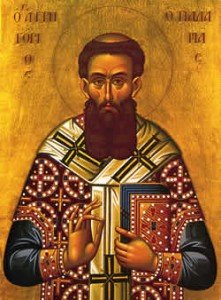I have been trying, in this article, to provide my readers with excerpts from the great Greek Fathers of Our Church. As you have probably deduced from the material I presented from the work of Gregory Palamas, the Fathers are not easy to understand. They all go to great lengths to formulate sound arguments to support their understanding of our faith. Gregory Palamas’ writings on the nature of the Light that emanated from our Lord during His Transfiguration, supports this contention.
All of the Fathers were strong debaters, being very well educated in logic and philosophy. These Fathers of the church indeed formulated our faith.
There was yet another formidable controversialist among the Greek Fathers that should be mentioned. Athanasius the Great. He gave us one of the truly great phrases from the Greek patristic tradition. He wrote of God the Word that He became human that we might be made divine. This pithy statement elegantly describes the true dynamic underlying the Eastern Christian idea of deification, or Theosis.
Athanasius was fully overwhelmed by the lengthy struggles he faced against the teachings about Christ advanced by the Alexandrian priest Arius. This phrase expresses, in a positive way, Athanasius’ persistent claim (so important during the Arian controversy) that, to act as Savior, Christ must be fully divine and fully human. Only thus could Christ bridge the absolute difference in essence that separates the divine from the created. He wrote, for other things, according to the nature of things originate, are without likeness in essence with the Maker.
Athanasius was similarly outspoken in insisting on the full divinity of the Holy Spirit, who is likewise deeply involved in the work of salvation. Indeed, the Spirit, no less than the Son, is implicated in deifying God’s creation. The actions of the Son and the Spirit are co-ordinated and consistent. It is through the Spirit that the Son’s activity is accomplished: As then the Father is light and the Son is his radiance – we must not shrink from saying the same things about them many times – we may see in the Son the Spirit also by whom we are enlightened. But when we are enlightened by the Spirit, it is Christ who in him enlightens us.
Athanasius tirelessly asserted the full and equal divinity of the Father, the Son and the Holy Spirit against a range of other theological views. Athanasius’ contribution to our faith is invaluable. We owe him great honor.

